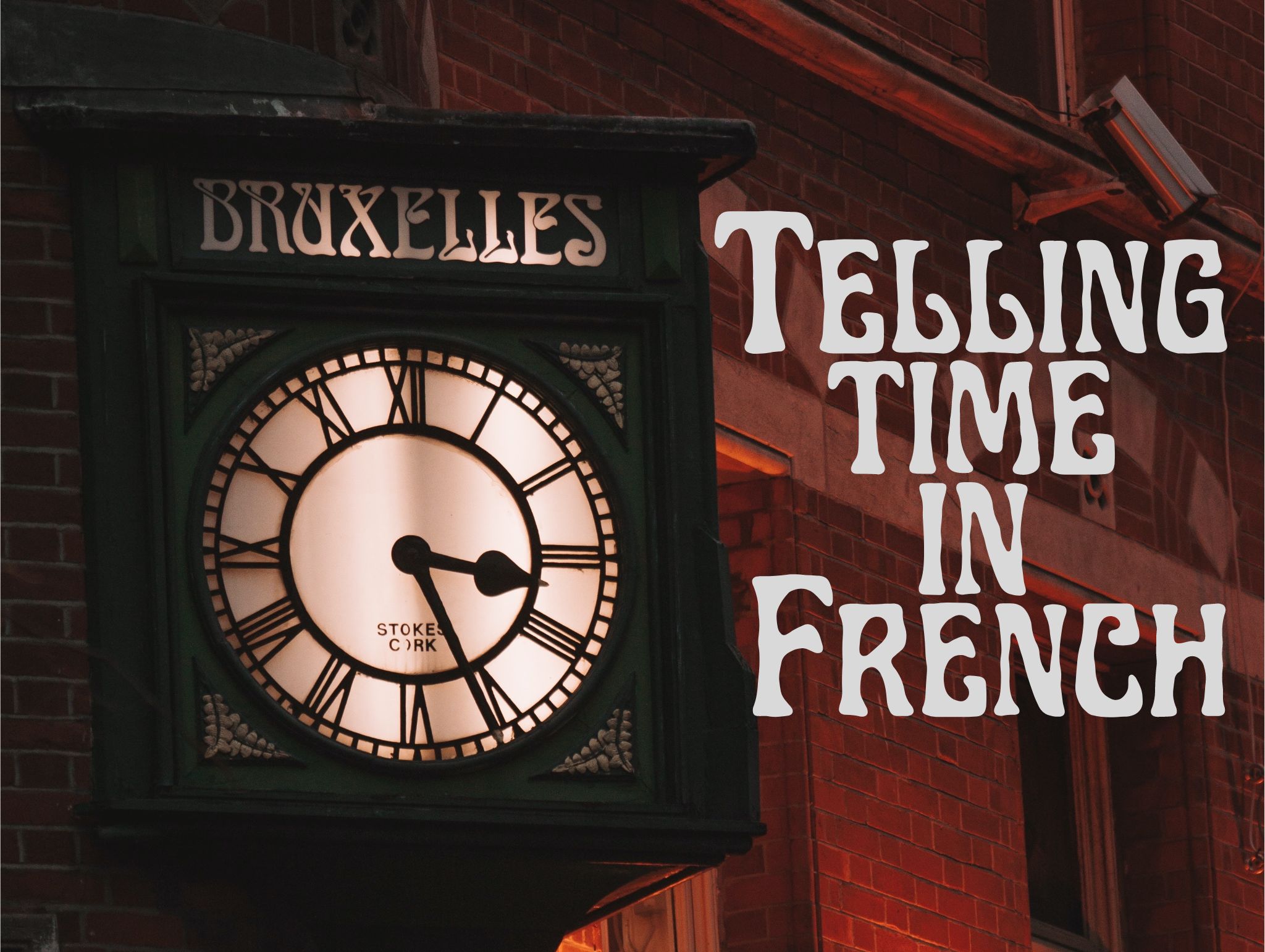Telling time in French: A simple guide

Get our free email course, Shortcut to Conversational.
Have conversations faster, understand people when they speak fast, and other tested tips to learn faster.
More infoWhether you’re booking a fancy Parisian restaurant or meeting a new friend, you’ll want to know how to tell time in French. Luckily, we’ve got everything you need to do so right here. In this post, we’ll explore how you can ask for the time, the different ways you can reply, and a few useful phrases to talk about the time of day.
So let’s get started with our simple guide to telling time in French!

This post is presented by LingoCulture, the number one way to learn French online.
LingoCulture students get access to unlimited 1-on-1 French classes with 50+ native teachers via video chat for $197/mo. Click here to start your 7-day trial for $1 today.
How to ask for the time in French
Before we get into how to tell time in French, let’s go over the common questions to ask for the time. We’ll also take a look at the two common French words for time: l’heure vs le temps.
Quelle heure est-il?
By far the most common way to ask the time, quelle heure est-il ?, means what time is it? in French.
Let’s break that simple phrase down. At the beginning, we’ve got quelle. If you’ve been studying your question words recently, you’ll recognize that quelle translates to which, so the literal translation is actually “which time is it?.”
In the middle of our question is heure, which literally translates as hour. So in fact, we could even say that our literal translation here is “which hour is it?.” In this context though, our best translation remains what time is it?.
At the end of our question for asking the time we’ve got est-il ?, meaning is it?. Just like in English, when telling the time in French we just invert these two words: il est. This il est conjugation of être is the only verb form you’ll need. You can review this form and more in our post on être conjugation.
- Quelle heure est-il ? / Il est midi. – What time is it? / It’s noon.
Avez-vous l’heure ?, As-tu l’heure ?
Just like in English, you might also want to ask somebody the slightly more informal question, do you have the time? / Have you got the time? In French, you simply ask avez-vous l’heure? or as-tu l’heure?, depending on the formality of the situation and how well you know the person.
Of course, no matter what way you’re asking, adding a “please” on the end never hurts!
- Quelle heure est-il, s’il vous plaît ? – What time is it, please?
- As-tu l’heure, s’il te plaît ? – Do you have the time, please?
L’heure vs Le temps
Before we move on, we should introduce le temps, which also translates literally as the time in French. So, since both can actually be translated as time, how do we differentiate between heure vs temps?
Well, when we use l’heure we’re talking about a specific point in time, which is what we’re looking for when we ask for the time.
- Quelle heure est-il ? / Il est minuit. – What time is it? / It’s midnight.
Meanwhile, le temps means time in a more abstract sense, where we speak of it as a concept.
- Tu as passé du bon temps à Paris? – Did you have a good time in Paris?
- Les temps sont durs. – Times are hard.
Le temps might crop up in your conversations about telling the time if somebody isn’t giving you a specific answer. You might hear something like…
- Quelle heure est-il ? Il est temps de partir! – What time is it? It’s time to go!
So what if you ask someone do you have the time in French using le temps? Well then you’re not asking for the hour, but rather whether the person has time in their schedule.
- J’ai besoin d’aide avec mes devoirs. As-tu le temps pour m’aider ? / Non, je n’ai pas le temps aujourd’hui. Je suis désolé. – I need some help with my homework. Do you have time to help me? / No, I don’t have time today. I’m sorry.
Telling Time in French
The 24-hour clock
First thing’s first: if you want to tell the time in French confidently, you’ll need to master the 24-hour clock. It’s often used for French time, so it’s worth wrapping your head it around early on. If you need a quick refresher on your numbers, now’s the time to brush up on them with our post on counting to 100 in French, as we’ll be using them a lot later on!
The 24-hour clock is even more important when you’re writing. There’s no French equivalent to AM or PM, so if you’re writing down the time, it has to take the 24-hour format. Another important detail in written French is that it’s just as common to see the hours and minutes separated with an h as it is to see the colon that you use in English.
- 14h00 – 14:00
- 16h20 – 16:20
That being said, when it comes to spoken French, it’s still common to hear the 12-hour clock used to tell the time. If you want to go for that option instead, you can easily add one of the modifiers listed below to clarify the time of day:
| Du petit matin | In the early morning (pre-dawn) |
| Du matin | In the morning |
| De l’après-midi | In the afternoon |
| Du soir | In the evening |
Now that you know how to ask for the time and to watch out for the 24-hour clock, we can get started on the ins and outs of telling the time itself!
O’clock
Much like in English, to tell someone the time you begin with it is…, or, in French, il est…. Then, of course, you’re going to need a number.
Telling the time in French when it’s dead on the hour is easy. You simply say il est, the number of the hour, and heure(s). If you’re using the 12 hour clock, you can add one of the clarifying phrases that we looked at above to specify the time of day, too. We can think of this as a formula: il est + number + heure(s) + optional time of day.
- Il est une heure de l’après-midi. – It’s one o’clock in the afternoon.
- Il est dix-sept heures. – It’s 5pm.
- Il est dix heures du soir. – It’s ten o’clock in the evening.
It’s important to remember a few things when we’re using the word heure(s). Firstly, you should use the singular heure only if it’s one o’clock (until 1:59). For all other times, go for the plural heures. Secondly, while it’s not uncommon in English to hear somebody say “it’s one” rather than “it’s one o’clock,” this just isn’t the case when telling the time in French. It’s really important to include heure(s) after you say which hour it is!
Adding minutes
What happens if you want to tell the time when it’s not just a simple o’clock?
Luckily, the other 59 minutes of the hour are also pretty straightforward. Let’s go back to our formula above: il est + number + heure(s) + optional time of day. The simplest way to tell the time would be to add the number of minutes past the hour that it is right after you’ve said heure(s) and before any optional clarification phrase.
- Il est deux heures dix. – It’s 2:10.
- Il est quatorze heures vingt-trois. – It’s 2:23pm.
- Il est onze heures trente du matin. – It’s 11:30 in the morning.
Moins
If it’s more than halfway through a given hour, you can also subtract minutes from the next hour rather than just adding them on. To do this in French we use moins, which translates literally as minus. This formulation is the equivalent of saying “it’s ten to four” rather than “it’s three fifty” in English.
Let’s go back to our formula. We start again with il est + the number + heure(s), but this time, add moins + the number of minutes you want to subtract. In this case, this would look like:
- Il est quatre heures moins dix. – It’s 3:50.
If you already know roughly what time it is, you might skip over saying the hour, just like you do in English.
- Le film commence à dix-neuf heures. Quelle heure est-il? Il est moins cinq! – The film starts at 9pm. What time is it? It’s five to!
- Nous sommes en retard. Il est moins dix. Il faut qu’on aille! – We’re late. It’s ten to. We need to go!
Fractions of the hour
Finally, we can also use fractions of the hour to tell the time in French. Just like in English, we have the following French equivalents for quarter past, half past, and quarter to to tell the time quickly.
| Et quart | Quarter past |
| Et demie | Half past |
| Moins le quart | Quarter to |
In French, we tend to use fractions only with the 12 hour clock. To do so, we return to the same formula we’ve been using throughout, but this time we substitute the minutes for one of the fraction compositions above. So now, it looks like: il est + number + heure(s) + fraction composition.
- Il est dix heures et quart. – It’s a quarter past ten.
- Il est huit heures et demie du soir. – It’s half past eight in the evening.
- Il est trois heures moins le quart de l’après-midi. – It’s a quarter to three in the afternoon.
Special cases: Midi and Minuit
There are two times of the day that can be considered special cases to the French time rules we’ve seen so far: midi and minuit, which are noon and midnight. What are the special rules for talking about 12:00 in French?
1. Saying il est minuit or il est midi is the only time you don’t say heure(s) when telling the time.
2. When we say it’s half past midnight, or half past noon, we say the masculine et demi, as opposed to the feminine et demie that we use when telling all other times.
Just like in English, minuit refers to the exact minute when the clock strikes twelve midnight. With midi, however, it might refer precisely to 12:00 but it can also be used more generally, corresponding more with the English midday or noontime. Usually, midi in French roughly corresponds to when people take their lunch break.
- Il est minuit et demi. – It’s half past midnight.
- Il est midi moins le quart. – It’s a quarter to noon.
- Où mangeons-nous ce midi ? – Where are we eating today at midday?
Conclusion: Telling time in French
There you have it! With a lot of similarities to English, it’s pretty straightforward to tell the time in French. You’ll now be able to confidently ask what time is it? in French as well as be able to tell the time in a few different ways, be it through the 24-hour clock, adding the minutes to the hour, or by showing off your fluency with variants like “moins le quart.” Of course, once your question has been answered, don’t forget to say thank you in French to the person you asked!
With plenty of chances every day to practice telling the time in French, we’re sure you’ll be able to tell the time like a native soon enough. Of course, if you get stuck, you can always come back to take a look at the examples and explanations here!
Thanks for checking out our simple guide on how to tell the time in French! If you’re looking for even more detail, like how to talk about times in French or adding additional layers of precision to the time, you can check out this in-depth lesson on telling time in French.


